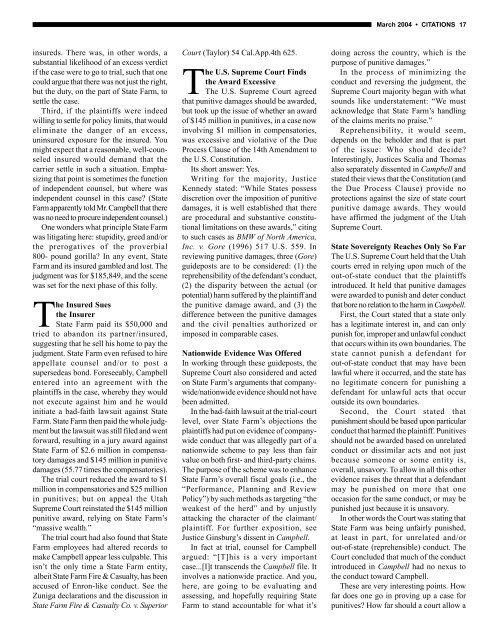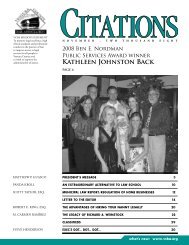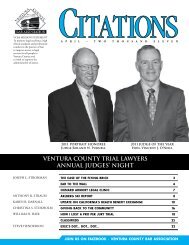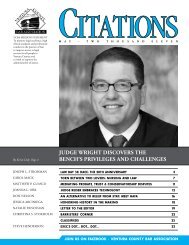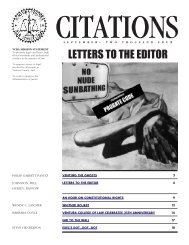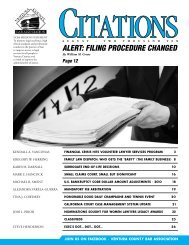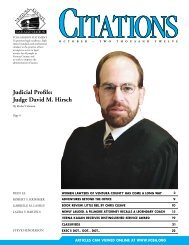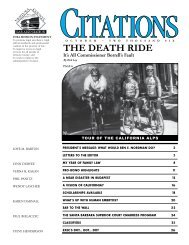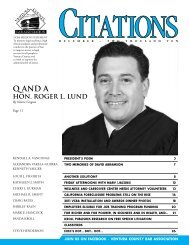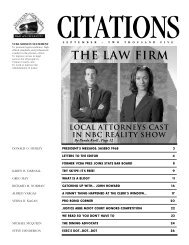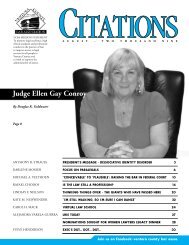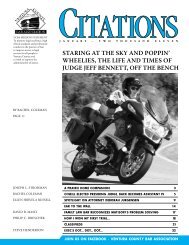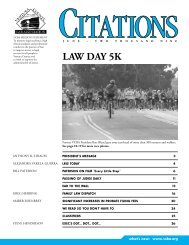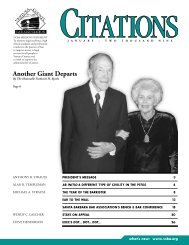March - Ventura County Bar Association
March - Ventura County Bar Association
March - Ventura County Bar Association
You also want an ePaper? Increase the reach of your titles
YUMPU automatically turns print PDFs into web optimized ePapers that Google loves.
<strong>March</strong> 2004 • CITATIONS 17<br />
insureds. There was, in other words, a<br />
substantial likelihood of an excess verdict<br />
if the case were to go to trial, such that one<br />
could argue that there was not just the right,<br />
but the duty, on the part of State Farm, to<br />
settle the case.<br />
Third, if the plaintiffs were indeed<br />
willing to settle for policy limits, that would<br />
eliminate the danger of an excess,<br />
uninsured exposure for the insured. You<br />
might expect that a reasonable, well-counseled<br />
insured would demand that the<br />
carrier settle in such a situation. Emphasizing<br />
that point is sometimes the function<br />
of independent counsel, but where was<br />
independent counsel in this case (State<br />
Farm apparently told Mr. Campbell that there<br />
was no need to procure independent counsel.)<br />
One wonders what principle State Farm<br />
was litigating here: stupidity, greed and/or<br />
the prerogatives of the proverbial<br />
800- pound gorilla In any event, State<br />
Farm and its insured gambled and lost. The<br />
judgment was for $185,849, and the scene<br />
was set for the next phase of this folly.<br />
The Insured Sues<br />
the Insurer<br />
State Farm paid its $50,000 and<br />
tried to abandon its partner/insured,<br />
suggesting that he sell his home to pay the<br />
judgment. State Farm even refused to hire<br />
appellate counsel and/or to post a<br />
supersedeas bond. Foreseeably, Campbell<br />
entered into an agreement with the<br />
plaintiffs in the case, whereby they would<br />
not execute against him and he would<br />
initiate a bad-faith lawsuit against State<br />
Farm. State Farm then paid the whole judgment<br />
but the lawsuit was still filed and went<br />
forward, resulting in a jury award against<br />
State Farm of $2.6 million in compensatory<br />
damages and $145 million in punitive<br />
damages (55.77 times the compensatories).<br />
The trial court reduced the award to $1<br />
million in compensatories and $25 million<br />
in punitives; but on appeal the Utah<br />
Supreme Court reinstated the $145 million<br />
punitive award, relying on State Farm’s<br />
“massive wealth.”<br />
The trial court had also found that State<br />
Farm employees had altered records to<br />
make Campbell appear less culpable. This<br />
isn’t the only time a State Farm entity,<br />
albeit State Farm Fire & Casualty, has been<br />
accused of Enron-like conduct. See the<br />
Zuniga declarations and the discussion in<br />
State Farm Fire & Casualty Co. v. Superior<br />
Court (Taylor) 54 Cal.App.4th 625.<br />
The U.S. Supreme Court Finds<br />
the Award Excessive<br />
The U.S. Supreme Court agreed<br />
that punitive damages should be awarded,<br />
but took up the issue of whether an award<br />
of $145 million in punitives, in a case now<br />
involving $1 million in compensatories,<br />
was excessive and violative of the Due<br />
Process Clause of the 14th Amendment to<br />
the U.S. Constitution.<br />
Its short answer: Yes.<br />
Writing for the majority, Justice<br />
Kennedy stated: “While States possess<br />
discretion over the imposition of punitive<br />
damages, it is well established that there<br />
are procedural and substantive constitutional<br />
limitations on these awards,” citing<br />
to such cases as BMW of North America,<br />
Inc. v. Gore (1996) 517 U.S. 559. In<br />
reviewing punitive damages, three (Gore)<br />
guideposts are to be considered: (1) the<br />
reprehensibility of the defendant’s conduct,<br />
(2) the disparity between the actual (or<br />
potential) harm suffered by the plaintiff and<br />
the punitive damage award, and (3) the<br />
difference between the punitive damages<br />
and the civil penalties authorized or<br />
imposed in comparable cases.<br />
Nationwide Evidence Was Offered<br />
In working through these guideposts, the<br />
Supreme Court also considered and acted<br />
on State Farm’s arguments that companywide/nationwide<br />
evidence should not have<br />
been admitted.<br />
In the bad-faith lawsuit at the trial-court<br />
level, over State Farm’s objections the<br />
plaintiffs had put on evidence of companywide<br />
conduct that was allegedly part of a<br />
nationwide scheme to pay less than fair<br />
value on both first- and third-party claims.<br />
The purpose of the scheme was to enhance<br />
State Farm’s overall fiscal goals (i.e., the<br />
“Performance, Planning and Review<br />
Policy”) by such methods as targeting “the<br />
weakest of the herd” and by unjustly<br />
attacking the character of the claimant/<br />
plaintiff. For further exposition, see<br />
Justice Ginsburg’s dissent in Campbell.<br />
In fact at trial, counsel for Campbell<br />
argued: “[T]his is a very important<br />
case...[I]t transcends the Campbell file. It<br />
involves a nationwide practice. And you,<br />
here, are going to be evaluating and<br />
assessing, and hopefully requiring State<br />
Farm to stand accountable for what it’s<br />
doing across the country, which is the<br />
purpose of punitive damages.”<br />
In the process of minimizing the<br />
conduct and reversing the judgment, the<br />
Supreme Court majority began with what<br />
sounds like understatement: “We must<br />
acknowledge that State Farm’s handling<br />
of the claims merits no praise.”<br />
Reprehensibility, it would seem,<br />
depends on the beholder and that is part<br />
of the issue: Who should decide<br />
Interestingly, Justices Scalia and Thomas<br />
also separately dissented in Campbell and<br />
stated their views that the Constitution (and<br />
the Due Process Clause) provide no<br />
protections against the size of state court<br />
punitive damage awards. They would<br />
have affirmed the judgment of the Utah<br />
Supreme Court.<br />
State Sovereignty Reaches Only So Far<br />
The U.S. Supreme Court held that the Utah<br />
courts erred in relying upon much of the<br />
out-of-state conduct that the plaintiffs<br />
introduced. It held that punitive damages<br />
were awarded to punish and deter conduct<br />
that bore no relation to the harm in Campbell.<br />
First, the Court stated that a state only<br />
has a legitimate interest in, and can only<br />
punish for, improper and unlawful conduct<br />
that occurs within its own boundaries. The<br />
state cannot punish a defendant for<br />
out-of-state conduct that may have been<br />
lawful where it occurred, and the state has<br />
no legitimate concern for punishing a<br />
defendant for unlawful acts that occur<br />
outside its own boundaries.<br />
Second, the Court stated that<br />
punishment should be based upon particular<br />
conduct that harmed the plaintiff. Punitives<br />
should not be awarded based on unrelated<br />
conduct or dissimilar acts and not just<br />
because someone or some entity is,<br />
overall, unsavory. To allow in all this other<br />
evidence raises the threat that a defendant<br />
may be punished on more that one<br />
occasion for the same conduct, or may be<br />
punished just because it is unsavory.<br />
In other words the Court was stating that<br />
State Farm was being unfairly punished,<br />
at least in part, for unrelated and/or<br />
out-of-state (reprehensible) conduct. The<br />
Court concluded that much of the conduct<br />
introduced in Campbell had no nexus to<br />
the conduct toward Campbell.<br />
These are very interesting points. How<br />
far does one go in proving up a case for<br />
punitives How far should a court allow a


